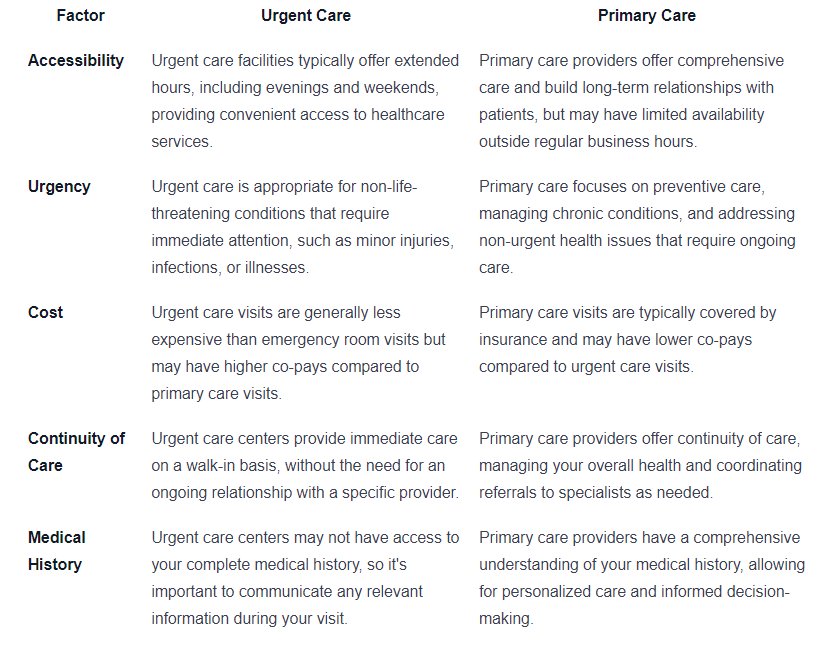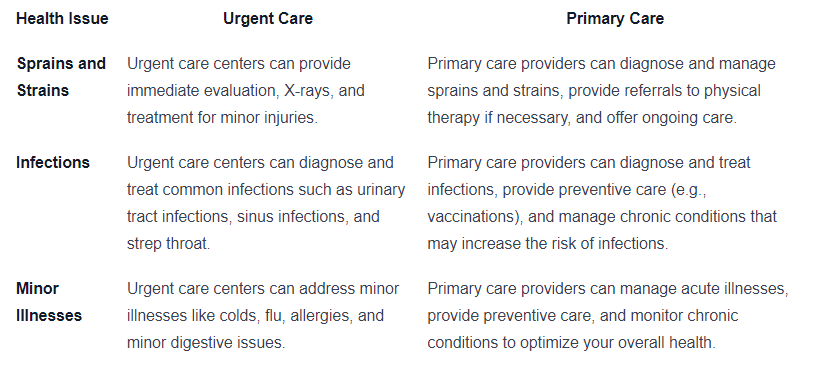Urgent Care vs. Primary Care: Which One Do You Need?
March 5, 2025
Urgent care vs. primary care: Which one suits your needs? Discover the best healthcare path for you and make informed decisions.


Understanding Your Healthcare Options
When it comes to managing your health, it's important to understand the different options available to you. Accessible healthcare plays a crucial role in maintaining your well-being and addressing any medical concerns that may arise. Two key options to consider are urgent care and primary care. Let's explore the importance of accessible healthcare and differentiate between these two healthcare settings.

Importance of Accessible Healthcare
Accessible healthcare is essential for individuals to receive timely medical attention and maintain their overall health. Having healthcare options that are readily available and easily accessible ensures that individuals can seek medical care when needed, preventing minor issues from escalating into more serious conditions.
Accessible healthcare also promotes early detection and prevention of diseases. Regular check-ups and screenings, which can be facilitated through primary care, help identify potential health issues before they become severe. By addressing health concerns proactively, individuals can lead healthier lives and reduce the risk of complications.
Differentiating Between Urgent Care and Primary Care
Urgent care and primary care are two distinct healthcare settings that serve different purposes.
Urgent Care:
Urgent care facilities are designed to address immediate healthcare needs that are not life-threatening but require prompt attention. These facilities often have extended hours, including evenings and weekends, to accommodate individuals who need urgent medical care outside of regular office hours.
Urgent Care Services
Treatment of minor injuries such as sprains and fractures
Management of common illnesses like cold and flu symptoms
Diagnostic services including X-rays and lab tests
Minor surgical procedures
Prescription of medication
Referral to specialists if necessary
Primary Care:
Primary care serves as the foundation of your healthcare. It involves a long-term relationship with a primary care physician who provides comprehensive healthcare services. Primary care physicians focus on preventive care, routine check-ups, and managing chronic conditions.
Primary Care Services
General wellness check-ups
Vaccinations and immunizations
Management of chronic conditions like diabetes or hypertension
Screening for common health issues
Referral to specialists if needed
Continuity of care and medical history tracking
Understanding the differences between urgent care and primary care is essential when it comes to making informed decisions about your healthcare needs. While urgent care is suitable for immediate non-life-threatening issues, primary care provides ongoing comprehensive care and is crucial for managing your overall health.
By considering your specific healthcare needs, the severity of your condition, and the level of continuity you require, you can make the right choice between urgent care and primary care to ensure you receive the appropriate care at the right time.
Urgent Care: When You Need Immediate Attention
When faced with sudden health concerns or injuries that require prompt medical attention, urgent care facilities serve as a valuable resource. Understanding what urgent care entails and the services offered can help you make informed decisions about seeking immediate care.
What is Urgent Care?
Urgent care provides medical services for non-life-threatening conditions that require timely attention but do not necessarily warrant a visit to the emergency room. These facilities are equipped to handle a wide range of urgent medical issues, such as minor injuries, infections, and illnesses that cannot wait for a scheduled primary care appointment.
Urgent care centers are often staffed by healthcare professionals, including physicians, nurse practitioners, and physician assistants. They typically operate extended hours, including evenings and weekends, to provide accessible care when primary care offices may be closed.
Services Offered at Urgent Care Facilities
Urgent care facilities offer a variety of services to address urgent medical needs. While the specific services may vary between centers, the following are commonly provided:

Urgent care centers offer a convenient alternative to emergency rooms for non-life-threatening medical issues. They provide quick, efficient care, often with shorter wait times compared to emergency departments. However, it's important to note that urgent care is not intended to replace primary care. Establishing a relationship with a primary care physician is crucial for comprehensive, ongoing healthcare management.
By understanding the role of urgent care and the services available, you can make informed decisions about seeking immediate medical attention when necessary. Remember to consider the severity of your condition and the urgency of care required. If you are experiencing a life-threatening emergency, call emergency services immediately.
Primary Care: Your Health Home Base
When it comes to managing your overall health and well-being, primary care plays a crucial role. Let's take a closer look at what primary care entails and the important role that primary care physicians play in your health.
What is Primary Care?
Primary care is a comprehensive and continuous form of healthcare that serves as your first point of contact for addressing various health concerns. It focuses on preventive care, health maintenance, and managing both acute and chronic conditions. Primary care providers, such as general practitioners, family physicians, and internists, are trained to provide a wide range of medical services to patients of all ages.
Primary care involves building a long-term relationship with your healthcare provider, allowing them to understand your medical history, lifestyle, and individual healthcare needs. This continuity of care enables your primary care physician to provide personalized and holistic care, emphasizing preventive measures and early detection of potential health issues.
Role of Primary Care Physicians in Your Health
Primary care physicians play a vital role in promoting and protecting your overall health. They serve as your health home base, coordinating and managing your healthcare needs throughout your life. Here are some key responsibilities of primary care physicians:
- Preventive Care: Primary care physicians focus on preventive measures and screenings to detect potential health issues early on. They provide vaccinations, conduct routine check-ups, and offer guidance on healthy lifestyle choices, such as exercise and nutrition.
- Health Maintenance: Primary care physicians are responsible for managing your overall health and well-being. They monitor chronic conditions, provide ongoing treatment, and ensure that medications are appropriate and effective.
- Diagnosis and Treatment: When you experience new symptoms or health concerns, primary care physicians are often the first point of contact. They evaluate your symptoms, perform diagnostic tests, and develop treatment plans. In cases where specialized care is needed, they may refer you to appropriate specialists.
- Coordination of Care: Primary care physicians act as a central hub for managing your healthcare. They coordinate referrals to specialists, monitor the results of diagnostic tests, and ensure that your healthcare needs are met across various healthcare settings.
By establishing a long-term relationship with a primary care physician, you can benefit from personalized care, continuity, and a comprehensive approach to managing your health. Regular visits to your primary care physician help to promote early detection of health issues, prevent the progression of chronic conditions, and provide a foundation for your overall well-being.
Remember, primary care is not just about addressing acute illnesses; it's about nurturing a partnership with a healthcare professional who understands your unique health needs and supports you in achieving optimal health outcomes.
Evaluating Your Needs
When faced with a health concern, it's important to evaluate your needs and determine whether urgent care or primary care is the most appropriate option for your situation. Consider the following factors when choosing between urgent care and primary care:
Factors to Consider When Choosing Between Urgent Care and Primary Care

Examples of Common Health Issues for Each Setting

By considering these factors and understanding the types of health issues commonly addressed in each setting, you can make an informed decision about whether urgent care or primary care is the most suitable choice for your specific healthcare needs. Remember, for life-threatening emergencies, always seek immediate medical attention by calling emergency services.
Making the Right Choice
When it comes to choosing between urgent care and primary care, it's important to make informed decisions based on your specific situation. Understanding the differences between the two and considering your healthcare needs will help you determine the most appropriate choice. Additionally, establishing long-term healthcare relationships is crucial for maintaining your overall well-being.
Making Informed Decisions Based on Your Situation
To make the right choice between urgent care and primary care, consider the urgency and complexity of your health issue. Urgent care is designed to address immediate medical needs that are not life-threatening but require prompt attention. It is a convenient option for minor injuries, illnesses, or conditions that cannot wait for a regular appointment with a primary care physician.
On the other hand, primary care focuses on comprehensive, ongoing healthcare. Primary care physicians serve as your first point of contact for preventive care, routine check-ups, and management of chronic conditions. Establishing a relationship with a primary care provider allows for continuity of care and personalized attention to your long-term health needs.
To help you decide which option is best for your situation, consider the following factors:
- Urgency: Is your condition urgent and requires immediate attention? In such cases, urgent care may be the appropriate choice.
- Complexity: Is your condition complex or chronic, requiring ongoing care and management? Primary care is better suited for these situations.
- Convenience: Urgent care facilities often offer extended hours, including evenings and weekends, making them convenient for immediate but non-emergency medical needs. Primary care clinics generally operate on regular business hours.
- Cost: Urgent care visits may be more expensive than a primary care visit, especially if you have insurance coverage that includes primary care co-pays.
Remember, if you're unsure about the severity of your symptoms or need guidance on the appropriate course of action, it's always best to consult with a healthcare professional.
How to Establish Long-Term Healthcare Relationships
Establishing long-term healthcare relationships is vital for your overall health and well-being. Here are some steps to help you establish and maintain these relationships:
- Research: Look for primary care physicians or healthcare providers in your area. Consider factors such as their experience, expertise, and patient reviews.
- Consultations: Schedule consultations with potential primary care providers to discuss your healthcare needs and assess their compatibility with your preferences and values.
- Communication: Open and honest communication is crucial in building trust and ensuring effective healthcare. Be proactive in discussing your medical history, concerns, and goals with your primary care provider.
- Regular Check-ups: Schedule regular check-ups with your primary care provider to monitor your health, receive preventive care, and address any emerging issues.
- Follow-up: Follow through with recommended treatments, medications, and lifestyle changes advised by your primary care provider.
By making informed decisions based on your situation and establishing long-term healthcare relationships, you can navigate the healthcare system more effectively and receive the appropriate care for your needs. Remember, both urgent care and primary care play essential roles in ensuring your health and well-being, so it's important to utilize them appropriately based on the nature and urgency of your medical concerns.
Sources
https://www.khealth.com/learn/healthcare/urgent-care-vs-primary-care/#:~:text=While%20pri
https://www.edenhealth.com/blog/urgent-care-vs-primary-care/
https://www.stjohns.health/blog/2023/october/urgent-care-vs-primary-care/













